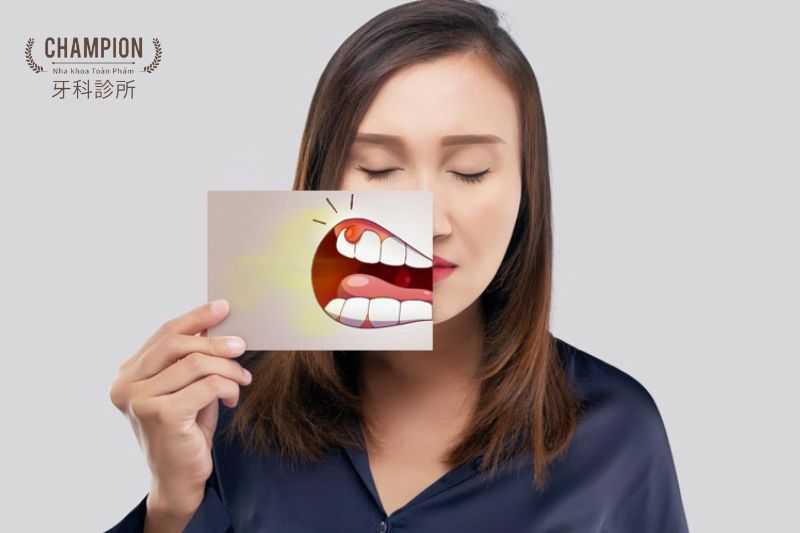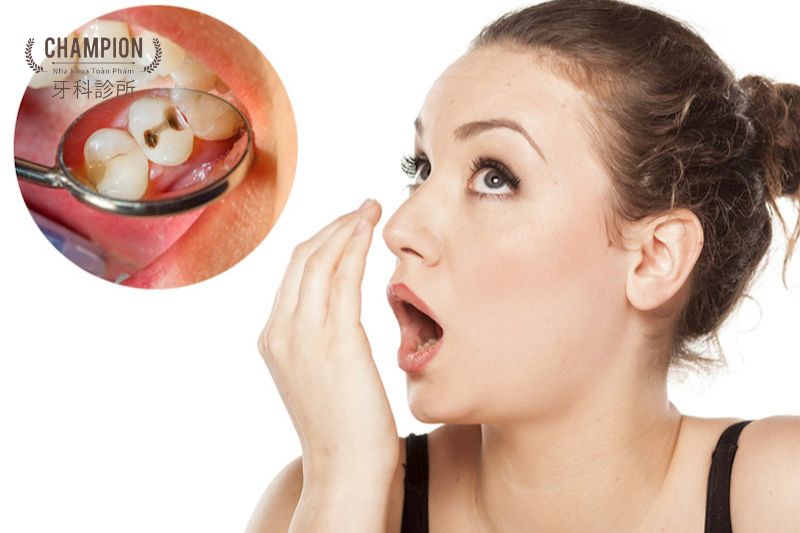Cavities not only impact gum and tooth health but are also a primary cause of bad breath. Bad breath can stem from various reasons, but when teeth have cavities, it creates favorable conditions for the growth of bacteria that cause bad breath. How can this situation be addressed? Follow the article below from Champion Dental Clinic to find out!
Why is tooth decay the main cause of bad breath?
Tooth decay is not only an oral health issue but also a significant contributor to bad breath. While various factors like alcohol and tobacco use, dry mouth, and poor oral hygiene can contribute to bad breath, tooth decay plays a crucial role in creating an environment conducive to the growth of odor-causing bacteria.
When teeth suffer from decay, the tooth enamel, the protective layer on the tooth's surface, is compromised. Cavities form and become ideal locations for bacteria accumulation. These bacteria not only concentrate in the cavities but also spread to other oral surfaces such as the tongue, gums, and oral cavities. This creates an environment where bacteria can thrive, attacking from multiple directions and leading to bad breath.
Even after treating cavities with dental fillings, the issue of bad breath may persist. In some cases, dental filling materials may not entirely match the natural tooth, providing favorable conditions for odor-causing bacteria to hide and thrive beneath the filling. This makes the odor more challenging to control and can sometimes result in discomfort during interpersonal communication. Therefore, maintaining regular oral hygiene and check-ups after cavity treatment is crucial to preventing bad breath and preserving the health of your gums and teeth.

How does bad breath impact individuals?
Bad breath is not merely a straightforward oral health concern; it profoundly affects the psychological and daily lives of those dealing with this condition.
Psychological impact
Bad breath is a sensitive issue that can have significant negative effects on an individual's psyche. Those with bad breath often experience a loss of confidence and worry about their social interactions. Fear of others detecting the unpleasant odor can lead to restricted communication, avoidance of social situations, and a reduction in the quality of daily life.
Impact on social relationships
Bad breath can create barriers in social relationships and daily interactions. Individuals with this condition may feel anxious when participating in meetings, gatherings, or even in personal communication with friends and family. Self-consciousness and hesitation can lead to minimizing social connections, contributing to a sense of isolation that affects overall mental and emotional well-being.
Impact on oral health
Beyond psychological issues, bad breath is also indicative of various oral health problems. It can be a sign of gum inflammation, tooth decay, or other gum diseases. If not treated promptly, these issues can spread and have a substantial impact on the overall quality and health of the entire oral system.

>> See more: Discolored teeth due to dietary habits: How to adjust for suitability?
How to remedy bad breath caused by tooth decay?
Tooth decay is a primary cause of bad breath, and halitosis resulting from tooth decay not only causes mental discomfort but also impacts gum and tooth health. Here are effective ways to address and prevent this issue
Prevent Dry Mouth
Keeping the mouth moist is a simple and effective way to treat bad breath. Saliva helps cleanse the mouth and eliminate odor-causing bacteria. Limit smoking and ensure adequate water intake to reduce bacteria and stimulate saliva production. Additionally, sugar-free gum or gum with xylitol can stimulate saliva production.
Use Mouthwash
Commercial mouthwashes containing antibacterial agents can help prevent bad breath. Use mouthwash after brushing your teeth or consuming meals to maintain fresh breath. Saltwater rinse is a natural alternative that can help inhibit bacteria in the oral cavity, tongue, and throat.
Chew Mint or Apple Leaves
Mint leaves contain aromatic oils and antibacterial properties, reducing bad breath. Chewing fresh mint leaves or combining them with salt or lemon can enhance effectiveness. Apples are also effective in combating odor due to their polyphenol content, promoting natural mouth cleaning and bacteria elimination.
Maintain Proper Oral Hygiene
Proper oral care is key to preventing tooth decay and bad breath. Brush teeth using proper technique with a soft-bristled toothbrush at least twice a day. Use dental floss and interdental brushes to remove plaque and residual food particles. Seek professional dental care for correct cavity treatment, regular scaling, and check-ups to maintain oral health and prevent bad breath at its source.

Conclusion
Oral health maintenance is crucial not only for an attractive smile but also for protecting mental well-being and facilitating positive social relationships. For those facing bad breath issues, seeking advice and specialized treatment from dental experts is essential to address the problem and restore confidence in daily life. To schedule a dental check-up, please contact Champion Dental Clinic for assistance!
Vietnamese & English: (028) 5411-2295
中文: (028) 5411-2297 172 Nguyen Luong Bang, Tan Phu Ward, District 7, Ho Chi Minh City.
Fanpage: Champion Dental Clinic 牙科診所
Zalo: Champion Dental Clinic
Youtube: Champion Dental Clinic 牙科診所
 Champion Dental Clinic
Champion Dental Clinic



